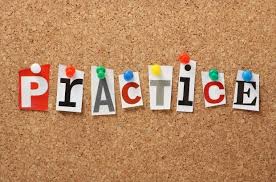The Importance of Practice in Achieving Excellence
Practice is the cornerstone of success in any endeavour. Whether it’s mastering a musical instrument, excelling in a sport, or honing a skill, dedicated practice is essential for achieving excellence.
Practice allows individuals to refine their abilities, improve their performance, and reach new levels of proficiency. It is through consistent practice that one can overcome challenges, push boundaries, and unlock their full potential.
Deliberate practice involves focused and purposeful repetition of tasks with the intention of improvement. This type of practice requires dedication, discipline, and perseverance. It is not about mindlessly going through the motions but rather about pushing oneself beyond comfort zones and striving for continuous growth.
Successful individuals across various fields attribute their achievements to relentless practice. From renowned musicians who spend countless hours perfecting their craft to athletes who train rigorously to enhance their skills, the common denominator is a commitment to consistent and deliberate practice.
Practice not only enhances technical proficiency but also builds resilience, determination, and self-discipline. It instills a sense of mastery and accomplishment that fuels motivation and drives individuals towards their goals.
In conclusion, practice is the key to unlocking excellence. By embracing the process of deliberate practice with dedication and determination, individuals can elevate their performance, achieve mastery in their chosen pursuits, and ultimately reach new heights of success.
Five Effective Strategies for Enhancing Your Practice Sessions
- Set specific goals for each practice session.
- Focus on quality over quantity of practice time.
- Break down difficult passages into smaller sections for better mastery.
- Use a metronome to improve timing and rhythm during practice.
- Don’t forget to take breaks during long practice sessions to avoid burnout.
Set specific goals for each practice session.
Setting specific goals for each practice session is a crucial tip to maximise the effectiveness of your practice routine. By clearly defining what you aim to achieve during a practice session, you provide yourself with direction and focus. Specific goals help you break down larger objectives into manageable tasks, allowing for measurable progress and a sense of accomplishment. Whether it’s mastering a particular technique, improving your speed, or perfecting a challenging piece, setting specific goals ensures that your practice sessions are purposeful and productive. This approach not only enhances your skills but also boosts motivation and drives continuous improvement in your craft.
Focus on quality over quantity of practice time.
When it comes to practice, prioritising quality over quantity of practice time is crucial for achieving meaningful progress and mastery in any skill or discipline. By focusing on the effectiveness of each practice session rather than simply clocking in hours, individuals can maximise their learning potential and refine their abilities more efficiently. Quality practice involves deliberate focus, attention to detail, and a commitment to continuous improvement. By honing in on specific areas for development and maintaining a high level of concentration during practice sessions, individuals can elevate the impact of their efforts and accelerate their journey towards excellence.
Break down difficult passages into smaller sections for better mastery.
Breaking down difficult passages into smaller sections is a highly effective practice tip that can significantly enhance mastery. By deconstructing complex material into manageable parts, individuals can focus on mastering each section thoroughly before moving on to the next. This approach not only aids in better understanding but also allows for targeted practice and gradual improvement. By tackling smaller sections systematically, learners can build confidence, strengthen their skills, and ultimately achieve greater proficiency in challenging passages.
Use a metronome to improve timing and rhythm during practice.
Using a metronome is a valuable tool to enhance timing and rhythm during practice sessions. By setting the metronome to a specific tempo, musicians can develop a strong sense of timing, improve their accuracy, and refine their ability to stay in sync with the beat. This precision in timing not only enhances the overall quality of performance but also cultivates a deeper understanding of musical structure and phrasing. Incorporating a metronome into practice routines can help musicians develop a more solid foundation in rhythm, leading to greater confidence and proficiency in their musical endeavours.
Don’t forget to take breaks during long practice sessions to avoid burnout.
It is essential to remember to take breaks during extended practice sessions to prevent burnout. Continuous practice without rest can lead to mental and physical fatigue, diminishing the effectiveness of the practice session. By incorporating short breaks into long practice sessions, individuals give themselves the opportunity to recharge, refocus, and maintain optimal performance levels. These pauses not only help prevent burnout but also promote better concentration, productivity, and overall well-being during practice sessions. Remember, taking breaks is not a sign of weakness but a strategic approach to maximising the benefits of practice and ensuring long-term success.

